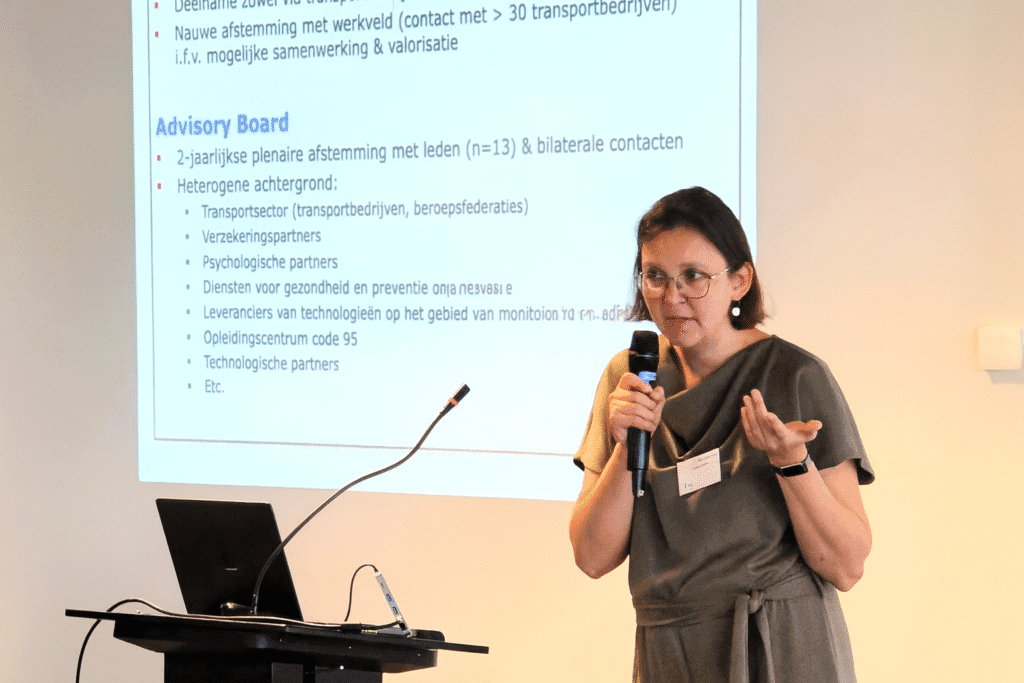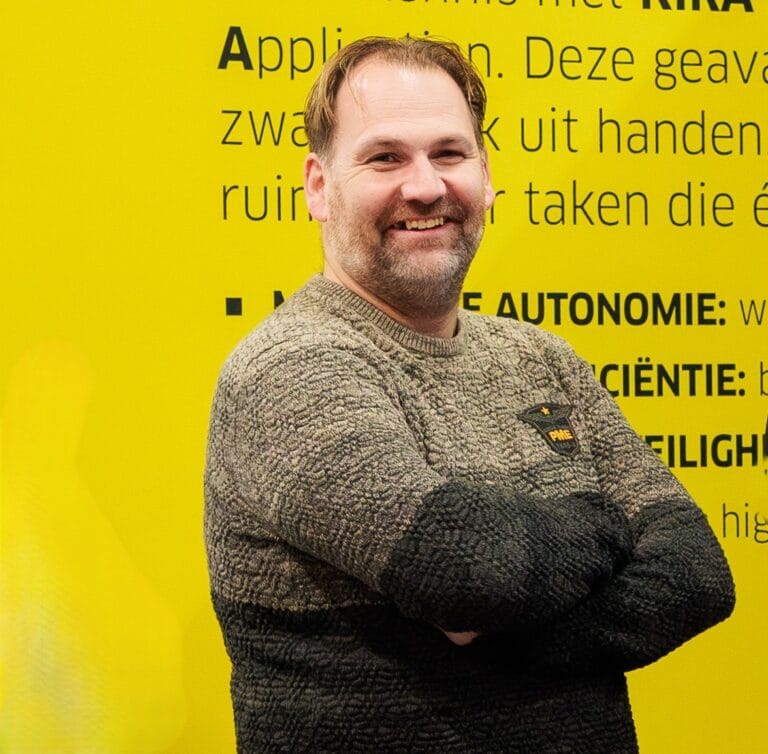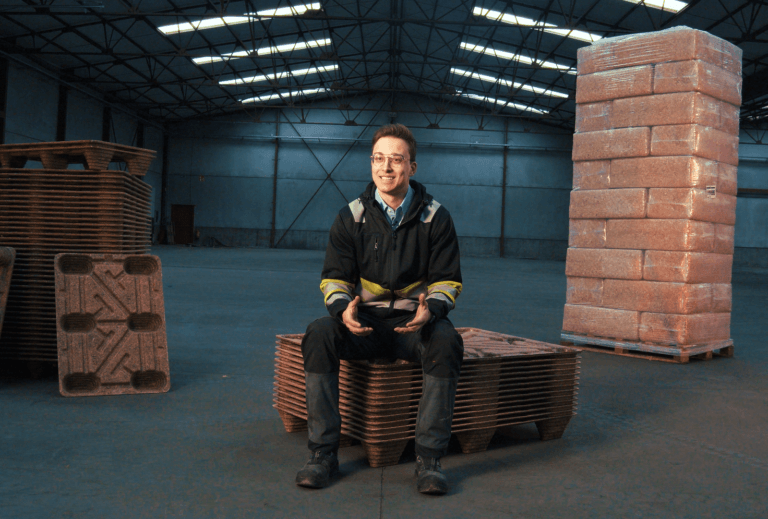MILESTONE: Simple technology reduces driver stress and improves road safety

Professional drivers in freight transport work under challenging conditions that can lead to fatigue, chronic stress and even depression. These factors have a major impact on road safety. That is why IMOB UHasselt, KU Leuven, the University of Antwerp and VIL, supported by VLAIO, launched the MILESTONE project. The result is an innovative and scientifically validated approach that helps companies improve driver wellbeing and increase road safety.
The transport sector faces major challenges. While freight volumes continue to rise and demand for courier services grows, Europe is experiencing a historic shortage of professional drivers. At the same time, drivers face irregular working hours, high workloads and limited recovery time. These conditions often lead to fatigue, stress and health problems that directly affect road safety.
From measurement to insight
What sets MILESTONE apart from other initiatives is the combination of objective data, scientifically validated measurements and practical applications. “While many initiatives focus on training and coaching, we took it a step further by combining objective measurements with practical applications in the workplace,” says An Neven, project coordinator at IMOB. “Using wearable sensors, a user-friendly app and smart monitoring tools, stress, sleep and driving behaviour are monitored. The results are translated into concrete insights and recommendations for drivers, planners and managers.”
The project followed 63 drivers from various segments – from short- and long-distance transport to local parcel delivery – over several months. First, the problem was mapped by monitoring the relationship between sleepiness, stress, thermal comfort and driving behaviour. Then this relationship was further mapped by comparing the drivers’ subjective experience with objective data on the road. In another phase, technological interventions (read: tools and solutions) were co-created after workshops with the drivers. Finally, the impact of the developed interventions was studied in real-life conditions.
Monitoring stress
Drivers were monitored for a month during their road trips. Measurements were taken using a Fitbit wearable, a GPS logger to track driving behaviour, a cabin environmental sensor and daily questionnaires via the MILESTONE app.
KU Leuven developed a personalised stress model that recorded an average of 9.7 stress moments per day. Peaks occurred mainly in the early morning or night, on Fridays and Saturdays, in urban traffic and on complex roads such as connection and access roads.
Dispatching and customers often cause stress
The stressors themselves were mapped as well, which naturally provides insights to act upon. “These are very diverse,” says Brent Peters, PhD researcher at IMOB. “The most important are: dispatcher behaviour, incorrect planning, disrespectful customers, detours, time pressure, lack of parking facilities, enforcement and stress from outside work. A striking observation is that traffic jams do not always cause stress.”
Stress influences driving behaviour
The results clearly show that stress and sleep quality have a noticeable impact on driving behaviour. On stressful days, drivers drove faster and made more steering corrections, especially on smaller roads. After a poor night’s sleep, there were more braking and acceleration movements, indicating less focused driving. Although the correlations were moderate on average, they underline the importance of real-time monitoring and prevention.
Tailored measures for drivers
To keep drivers within their ‘stress tolerance zone’ – a level where stress does not negatively affect driving or safety – MILESTONE developed several technological interventions. These include:
- Real-time vibration alerts to warn the driver in time and avoid excessive stress
- Personal feedback and advice via the app to reduce long-term stress
- A combination of real-time alerts and personalised feedback
- Exercise therapy with short exercises at fixed moments in the workplace
Some drivers were only monitored through the app, wearable and sensors, without active intervention; while others were offered mindfulness sessions as a more traditional form of intervention.
Drivers tested one of these solutions for 4.5 months. The impact was positive. On average, a slightly calmer driving style was recorded (especially in residential streets) and in certain groups (exercise therapy and real-time stress alerts) the stress level measurably decreased. The greatest gain was increased awareness of stress, which is a first step towards behavioural change.
What companies can do with this
MILESTONE provides concrete tools for transport companies.
The personalised app gives drivers daily insight into their wellbeing and driving behaviour, and provides practical advice and personal goals.
For planners, a dashboard is available to monitor stress levels and driving behaviour and – in a later phase – adjust the schedule in real-time during acute stress. Several participants at the MILESTONE presentation in LogiVille emphasised that improved communication with dispatching is a very important factor in reducing stress. Optimising future schedules based on aggregated company insights is therefore necessary.
Transport companies can use the insights from the MILESTONE project to optimise health prevention, training and education, for example in the training of new drivers.
Training centres can also use these insights. By integrating modules on sleep, stress and recovery management into Code 95 training, they can better prepare drivers for the realities of the job.
Recommendations for the sector
The MILESTONE project provides – in detail – clear guidelines for drivers, planners/dispatchers and trainers. In summary they are:
- Drivers should maintain a regular sleep routine, recognise signs of fatigue and stay physically active
- Planners can contribute by creating realistic schedules, communicating empathetically and sharing information in time
- Training centres should place stress management and recovery at the heart of their programmes
Conclusion
MILESTONE shows that technology can not only measure but also actively contribute to driver wellbeing. “Now drivers, planners, coaches and HR managers can already use it to take targeted action. The test period was limited, but it demonstrates the potential of a continuous approach. To achieve lasting behavioural change it is important to structurally embed this monitoring as a fixed part of company processes and wellbeing policies,” concludes An Neven.
Want to learn more about MILESTONE and read the full list of concrete recommendations for drivers, planners and trainers?
Download the brochure here: MILESTONE Company Brochure (UHasselt)
Want to implement MILESTONE in your transport company or get more information?
Contact Steve Sel, Regional Manager at VIL (steve.sel@vil.be) or An Neven, Senior Lecturer IMOB UHasselt via milestone@uhasselt.be.



